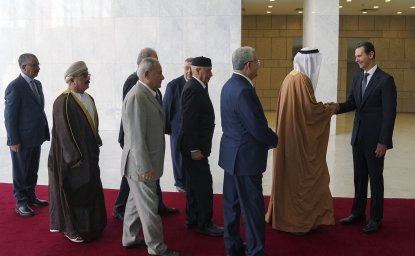Latin American Program in the News: Would Another Peace Accord Help Central America?
Director of the Latin America Program Cynthia Arnson was asked to comment on the Esquipulas II Peace Accords and the possibility of an Esquipulas III.
Director of the Latin America Program Cynthia Arnson was asked to comment on the Esquipulas II Peace Accords and the possibility of an Esquipulas III.
This commentary was originally published in the Inter-American Dialogue's Latin America Advisor on August 27, 2012.
Cynthia J. Arnson: "Esquipulas II represented an unprecedented effort on the part of Central American nations to put forward a common vision for how to overcome armed conflict in the region. It was not a laundry list of objectives, but rather a relatively small number of basic principles to guide internal as well as international behavior: privileging dialogue and negotiation over military means, promoting internal democratization and calling for an end to outside support of the parties to the conflict. The peace plan provided a basic architecture around which multiple actors coalesced and it became a central organizing principle for U.S. policy in an environment fractured, first, by the Iran- Contra scandal, and subsequently by the end of the Cold War. Since the end of armed conflict, there have been many advances in terms of formal democratization—the widening of political spaces, a much more open and plural debate in the media, growing activism by groups in civil society on a host of policy issues. But the crisis of citizen security and gang violence—which pre-dated by and is far more prevalent than the violence caused by drug trafficking and other forms of transnational organized crime—is reinforcing authoritarian tendencies, retarding processes of judicial and police reform and making the material conditions of life for large numbers of people simply intolerable. Moreover, the absence of consensus on social issues, reflected in some of the lowest rates of taxation in the hemisphere and levels of spending on education and health that are below the regional averages, has left deep social cleavages that provide a steady incentive for millions of people to migrate. Overcoming these deep social divides is an urgent task. The failure to do so only exacerbates the security problems and in more global terms, undermines the region’s competitiveness. Esquipulas III must have the construction of social pacts as its central goal, without which Central American countries will continue to find it impossible to achieve sustainable development or resolve the deep security crisis."


The Wilson Center’s prestigious Latin America Program provides non-partisan expertise to a broad community of decision makers in the United States and Latin America on critical policy issues facing the Hemisphere. The Program provides insightful and actionable research for policymakers, private sector leaders, journalists, and public intellectuals in the United States and Latin America. To bridge the gap between scholarship and policy action, it fosters new inquiry, sponsors high-level public and private meetings among multiple stakeholders, and explores policy options to improve outcomes for citizens throughout the Americas. Drawing on the Wilson Center’s strength as the nation’s key non-partisan policy forum, the Program serves as a trusted source of analysis and a vital point of contact between the worlds of scholarship and action. Read more



